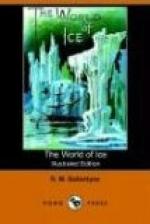In less than half-an-hour the rescue party were equipped and on their way over the floes. They were six in all—one of the freshest among the crew having volunteered to join those already mentioned.
It was a very dark night, and bitterly cold; but they took nothing with them except the clothes on their backs, a supply of provisions for their lost comrades, their sleeping-bags, and a small leather tent. The captain also took care to carry with them a flask of brandy.
The colossal bergs, which stretched like well-known land-marks over the sea, were their guides at first; but after travelling ten hours without halting, they had passed the greater number of those with which they were familiar, and entered upon an unknown region. Here it became necessary to use the utmost caution. They knew that the lost men must be within twenty miles of them, but they had no means of knowing the exact spot, and any footprints that had been made were now obliterated. In these circumstances Captain Guy had to depend very much on his own sagacity.
Clambering to the top of a hummock, he observed a long stretch of level floe to the northward.
“I think it likely,” he remarked to Saunders, who had accompanied him, “that they may have gone in that direction. It seems an attractive road among this chaos of ice-heaps.”
“I’m no sure o’ that,” objected Saunders; “yonder’s a pretty clear road away to the west, maybe they took that.”
“Perhaps they did, but as Fred said they had gone far out on the ice to the north, I think it likely they’ve gone in that direction.”
“Maybe ye’re right, sir, and maybe ye’re wrang,” answered Saunders, as they returned to the party. As this was the second mate’s method of intimating that he felt that he ought to give in (though he didn’t give in, and never would give in absolutely), the captain felt more confidence in his own opinion.
“Now, Meetuck, keep your eyes open,” he added, as they resumed their rapid march.
After journeying on for a considerable distance, the men were ordered to spread out over the neighbouring ice-fields, in order to multiply the chances of discovering tracks; but there seemed to be some irresistible power of attraction which drew them gradually together again, however earnestly they might try to keep separate. In fact, they were beginning to be affected by the long-continued march and the extremity of the cold.
This last was so great that constant motion was absolutely necessary in order to prevent them from freezing. There was no time allowed for rest—life and death were in the scale. Their only hope lay in a continuous and rapid advance, so as to reach the lost men ere they should freeze or die of starvation.
“Holo! look ’eer!” shouted Meetuck, as he halted and went down on his knees to examine some marks on the snow.
“These are tracks!” cried Captain Guy eagerly. “What think you, Saunders?”




